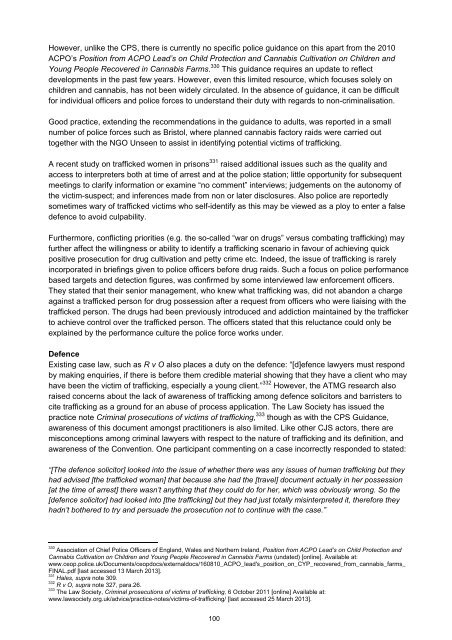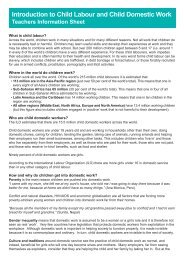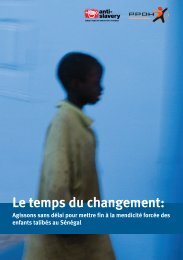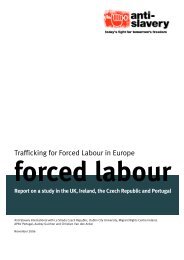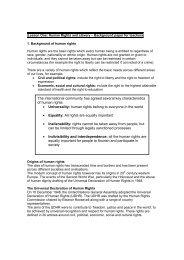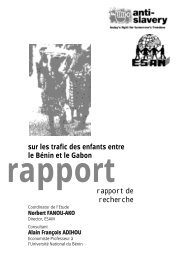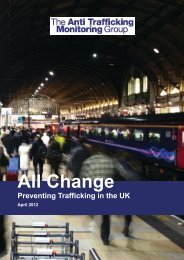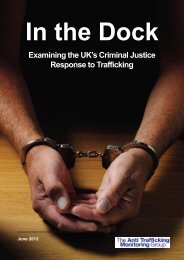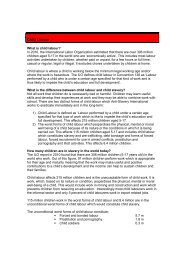However, unlike <strong>the</strong> CPS, <strong>the</strong>re is currently no specific police guidance on this apart from <strong>the</strong> 2010ACPO’s Position from ACPO Lead’s on Child Protection and Cannabis Cultivation on Children andYoung People Recovered in Cannabis Farms. 330 This guidance requires an update to reflectdevelopments in <strong>the</strong> past few years. However, even this limited resource, which focuses solely onchildren and cannabis, has not been widely circulated. <strong>In</strong> <strong>the</strong> absence of guidance, it can be difficultfor individual officers and police forces to understand <strong>the</strong>ir duty with regards to non-criminalisation.Good practice, extending <strong>the</strong> recommendations in <strong>the</strong> guidance to adults, was reported in a smallnumber of police forces such as Bristol, where planned cannabis factory raids were carried outtoge<strong>the</strong>r with <strong>the</strong> NGO Unseen to assist in identifying potential victims of trafficking.A recent study on trafficked women in prisons 331 raised additional issues such as <strong>the</strong> quality andaccess to interpreters both at time of arrest and at <strong>the</strong> police station; little opportunity for subsequentmeetings to clarify information or examine “no comment” interviews; judgements on <strong>the</strong> autonomy of<strong>the</strong> victim-suspect; and inferences made from non or later disclosures. Also police are reportedlysometimes wary of trafficked victims who self-identify as this may be viewed as a ploy to enter a falsedefence to avoid culpability.Fur<strong>the</strong>rmore, conflicting priorities (e.g. <strong>the</strong> so-called “war on drugs” versus combating trafficking) mayfur<strong>the</strong>r affect <strong>the</strong> willingness or ability to identify a trafficking scenario in favour of achieving quickpositive prosecution for drug cultivation and petty crime etc. <strong>In</strong>deed, <strong>the</strong> issue of trafficking is rarelyincorporated in briefings given to police officers before drug raids. Such a focus on police performancebased targets and detection figures, was confirmed by some interviewed law enforcement officers.They stated that <strong>the</strong>ir senior management, who knew what trafficking was, did not abandon a chargeagainst a trafficked person for drug possession after a request from officers who were liaising with <strong>the</strong>trafficked person. The drugs had been previously introduced and addiction maintained by <strong>the</strong> traffickerto achieve control over <strong>the</strong> trafficked person. The officers stated that this reluctance could only beexplained by <strong>the</strong> performance culture <strong>the</strong> police force works under.DefenceExisting case law, such as R v O also places a duty on <strong>the</strong> defence: “[d]efence lawyers must respondby making enquiries, if <strong>the</strong>re is before <strong>the</strong>m credible material showing that <strong>the</strong>y have a client who mayhave been <strong>the</strong> victim of trafficking, especially a young client.” 332 However, <strong>the</strong> ATMG research alsoraised concerns about <strong>the</strong> lack of awareness of trafficking among defence solicitors and barristers tocite trafficking as a ground for an abuse of process application. The Law Society has issued <strong>the</strong>practice note Criminal prosecutions of victims of trafficking, 333 though as with <strong>the</strong> CPS Guidance,awareness of this document amongst practitioners is also limited. Like o<strong>the</strong>r CJS actors, <strong>the</strong>re aremisconceptions among criminal lawyers with respect to <strong>the</strong> nature of trafficking and its definition, andawareness of <strong>the</strong> Convention. One participant commenting on a case incorrectly responded to stated:“[The defence solicitor] looked into <strong>the</strong> issue of whe<strong>the</strong>r <strong>the</strong>re was any issues of human trafficking but <strong>the</strong>yhad advised [<strong>the</strong> trafficked woman] that because she had <strong>the</strong> [travel] document actually in her possession[at <strong>the</strong> time of arrest] <strong>the</strong>re wasn’t anything that <strong>the</strong>y could do for her, which was obviously wrong. So <strong>the</strong>[defence solicitor] had looked into [<strong>the</strong> trafficking] but <strong>the</strong>y had just totally misinterpreted it, <strong>the</strong>refore <strong>the</strong>yhadn’t bo<strong>the</strong>red to try and persuade <strong>the</strong> prosecution not to continue with <strong>the</strong> case.”330Association of Chief Police Officers of England, Wales and Nor<strong>the</strong>rn Ireland, Position from ACPO Lead’s on Child Protection andCannabis Cultivation on Children and Young People Recovered in Cannabis Farms (undated) [online]. Available at:www.ceop.police.uk/Documents/ceopdocs/externaldocs/160810_ACPO_lead's_position_on_CYP_recovered_from_cannabis_farms_FINAL.pdf [last accessed 13 March 2013].331Hales, supra note 309.332R v O, supra note 327, para.26.333The Law Society, Criminal prosecutions of victims of trafficking, 6 October 2011 [online] Available at:www.lawsociety.org.uk/advice/practice-notes/victims-of-trafficking/ [last accessed 25 March 2013].100
<strong>In</strong> some cases concerns were even raised over poor legal practice. It was reported by interviewedparticipants that a lack of contact time and consistency of legal representatives affect rapport and trustbuilding for full client disclosure. Many cases are handled by duty solicitors and advocates, who tendto advise clients to plead guilty on <strong>the</strong> basis that <strong>the</strong>ir evidence won’t be believed, or that if <strong>the</strong>y pleadguilty <strong>the</strong>y can present <strong>the</strong> exploitation to mitigate and reduce <strong>the</strong> final sentence. <strong>In</strong>deed, <strong>the</strong> prisonstudy observed in some cases, that acting in <strong>the</strong> best interests of such clients, defence advocatesconsidered equations based on length in custody ra<strong>the</strong>r than proving that <strong>the</strong> crime was committed inextraordinary circumstances. As foreign trafficked persons were unlikely to receive bail on <strong>the</strong> basis ofan increased risk of absconding, in some cases <strong>the</strong>y would have spent all or most of <strong>the</strong>ir probablesentence on remand by <strong>the</strong> time of <strong>the</strong>ir court hearing. Therefore pleading guilty would result in lesstime spent in prison than a possible longer sentence if <strong>the</strong>y plead not guilty and are convicted of anoffence. 334Heavy workloads coupled with a lack of funding for cases requiring legal aid, as well as <strong>the</strong> time andeffort required to prepare <strong>the</strong> case, were said to have acted as significant obstacles for a traffickedperson to receive adequate representation. One legal practitioner described <strong>the</strong> situation:“Take for example a simple document offence - possession of a false passport. Normally such a caseinvolves several statements from several witnesses - up to, circa, 15 pages of evidence. If such a case is,after representations, discontinued, <strong>the</strong> fee received by <strong>the</strong> firm is in <strong>the</strong> order of £120. Now, to address <strong>the</strong>prosecution guidelines, <strong>the</strong> evidential and public interest tests, as well as source and provide third partyevidence along with instructions from <strong>the</strong> individual concerned, takes many hours of work. … At <strong>the</strong> currentlegal aid payment rates this can present as an unattractive proposition to a business. So one is left doing<strong>the</strong> work and making a substantial financial loss.”Some interviewed stakeholders suggested working with universities and <strong>the</strong> Law Society to embedtrafficking knowledge into course modules and Legal Practice Courses to ensure that this informationis engrained into future professional practice.Crown Court and Magistrates’ JudgesA judge may also raise <strong>the</strong>ir concerns that <strong>the</strong> suspect may in fact be a trafficked person. Whilst it wasascertained that awareness of trafficking has increased through prosecuting traffickers, <strong>the</strong> knowledgeof trafficking for forced criminal activities is low among judges, particularly magistrates. <strong>In</strong> only twocases observed in a recent prison study did <strong>the</strong> judge halt <strong>the</strong> proceedings and ask for fur<strong>the</strong>rassessments to be conducted. 335 An interviewed recently retired judge, with over 22 years on <strong>the</strong>bench, recalled sentencing many of <strong>the</strong> Vietnamese cannabis cases. He stated that no Article 26 ortrafficking arguments were made to stay <strong>the</strong> proceedings. Ra<strong>the</strong>r such arguments were made inmitigation and consisted around <strong>the</strong> individual playing a minor part in <strong>the</strong> organised crime group suchas a gardener. <strong>In</strong>deed, if <strong>the</strong> defence solicitor has advised <strong>the</strong>ir client to plead guilty <strong>the</strong> evidence oftrafficking may not arise until sentencing. However, in <strong>the</strong> prison study, <strong>the</strong> researchers found poorjudicial practice with one trafficked person being sentenced without <strong>the</strong> judge seeing <strong>the</strong> pre-sentencereport beforehand.<strong>In</strong> some instances <strong>the</strong> interviewed judge asked both prosecution and defence counsel if this case wasappropriate to prosecute. However, he was told that <strong>the</strong>y were following instructions from <strong>the</strong> CPS or<strong>the</strong>ir client. The interviewed judge also stated that judges could be more active in highlighting that <strong>the</strong>accused may be a trafficked person but may lack <strong>the</strong> confidence to do so or <strong>the</strong> knowledge that <strong>the</strong>defendant may be a trafficked person.Participants also raised concerns over <strong>the</strong> 2012 initiative Stop Delaying Justice! This initiative, led by<strong>the</strong> judiciary in <strong>the</strong> magistrates’ courts, is an attempt to expedite proceedings in contested trials i.e.334Hales, supra note 309.335Ibid.101
- Page 1 and 2:
In the DockExamining the UK’s Cri
- Page 3 and 4:
AcknowledgementsThis report was mad
- Page 5 and 6:
PrefaceIn May 2009, a group of nine
- Page 7 and 8:
Misconceptions around exploitation
- Page 9 and 10:
Acronyms and abbreviations frequent
- Page 11 and 12:
Executive SummaryIn the Dock is The
- Page 13 and 14:
Furthermore, the current legislatio
- Page 15 and 16:
The ATMG was made aware of some cas
- Page 17 and 18:
• Introduce mandatory child-speci
- Page 19 and 20:
• The UK’s ability to meet the
- Page 21 and 22:
Traffickers’ primary motivation i
- Page 23 and 24:
• Money launderers - turn profits
- Page 25 and 26:
out to perpetuate the exploitative
- Page 27 and 28:
[their] own enslavement” is as fu
- Page 29 and 30:
Chapter 2: UK Anti-Trafficking Legi
- Page 31 and 32:
nationals who commit trafficking of
- Page 33 and 34:
Like the SOA, the “act” element
- Page 35 and 36:
(b) D requires another person to pe
- Page 37 and 38:
Forced or compulsory labourThe defi
- Page 39 and 40:
ConclusionAs a consequence of the s
- Page 41 and 42:
concerningly, the number of convict
- Page 43 and 44:
women who were recruited in Poland
- Page 45 and 46:
Chapter 4: Identifying trafficking
- Page 47 and 48:
Misconceptions around exploitationT
- Page 49 and 50:
espond inadequately to a trafficked
- Page 51 and 52: multi-agency teams was described by
- Page 53 and 54: Josie Connors. 179 In summary, inte
- Page 55 and 56: defending a trafficked person for f
- Page 57 and 58: “[B]ecause the NRM decision is on
- Page 59 and 60: PTSD. 196 A Consultant Psychiatrist
- Page 61 and 62: etween the client and the police, i
- Page 63 and 64: Regular communication needs to be s
- Page 65 and 66: Priority planningA particular issue
- Page 67 and 68: Chapter 6: Multi-agency and interna
- Page 69 and 70: canvassing for tarmacking opportuni
- Page 71 and 72: Despite this, it would appear that
- Page 73 and 74: Good practice - Operation Golf 229O
- Page 75 and 76: Chapter 7: Criminal proceedingsThe
- Page 77 and 78: Law enforcement working on the case
- Page 79 and 80: trafficking require particular unde
- Page 81 and 82: JuryPractitioners suggested that th
- Page 83 and 84: years”. 258 Ambiguity within the
- Page 85 and 86: officer stated that not all judges
- Page 87 and 88: jurors to be assisted with expert e
- Page 89 and 90: Good feedback was received from sem
- Page 91 and 92: The Convention does recognise that
- Page 93 and 94: Another option for trafficked victi
- Page 95 and 96: There are two models with respect t
- Page 97 and 98: 1. Is there clear evidence that the
- Page 99 and 100: decision can be taken into account
- Page 101: also entails being “alert to the
- Page 105 and 106: Chapter 9: Prosecuting child traffi
- Page 107 and 108: However, many children are not refe
- Page 109 and 110: trafficking”. 352 It states: “W
- Page 111 and 112: Previous research has found that th
- Page 113 and 114: children as well as assisting in pr
- Page 115 and 116: Child trafficking trainingThere is
- Page 117 and 118: were too traumatic to involve them
- Page 119 and 120: committed by a child whilst in a co
- Page 121 and 122: • Introduce mandatory child-speci
- Page 123 and 124: IdentificationThe PSNI is the main
- Page 125 and 126: participants suggest that this is b
- Page 127 and 128: The PPS stated that the reasons for
- Page 129 and 130: this research was aware of potentia
- Page 131 and 132: convictions of traffickers prosecut
- Page 133 and 134: Possibly in response to certain hur
- Page 135 and 136: espectively. In addition to custodi
- Page 137 and 138: Conclusion and RecommendationsThe A
- Page 139 and 140: CRIMINAL PROCEEDINGS• Ensure that
- Page 141 and 142: Crown Prosecution Service, Legal Gu
- Page 143 and 144: Herman. J. Trauma and Recovery: The
- Page 145 and 146: Annex I: Trafficking and other form
- Page 147 and 148: (a) on summary conviction, to impri
- Page 149 and 150: (b) which country is the country of
- Page 151 and 152: 2009 Istvan Kalocsai (Snr)MetS.57 o
- Page 153 and 154:
2009 causing actual bodily harm, su
- Page 155 and 156:
Skirmantas Kvedaras Feed, 2010 Rape
- Page 157 and 158:
2012 Ahdel Ali (24)Mubarek Ali (29)
- Page 159 and 160:
Annex III: The CPS’s Seven Stages
- Page 161 and 162:
159


